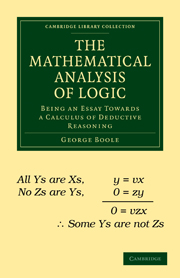Mathematical Analysis of Logic
Published online by Cambridge University Press: 29 August 2010
Summary
INTRODUCTION
They who are acquainted with the present state of the theory of Symbolical Algebra, are aware, that the validity of the processes of analysis does not depend upon the interpretation of the symbols which are employed, but solely upon the laws of their combination. Every system of interpretation which does not affect the truth of the relations supposed, is equally admissible, and it is thus that the same process may, under one scheme of interpretation, represent the solution of a question on the properties of numbers, under another, that of a geometrical problem, and under a third, that of a problem of dynamics or optics. This principle is indeed of fundamental importance; and it may with safety be affirmed, that the recent advances of pure analysis have been much assisted by the influence which it has exerted in directing the current of investigation.
But the full recognition of the consequences of this important doctrine has been, in some measure, retarded by accidental circumstances. It has happened in every known form of analysis, that the elements to be determined have been conceived as measurable by comparison with some fixed standard. The predominant idea has been that of magnitude, or more strictly, of numerical ratio. The expression of magnitude, or of operations upon magnitude, has been the express object for which the symbols of Analysis have been invented, and for which their laws have been investigated.
- Type
- Chapter
- Information
- The Mathematical Analysis of LogicBeing an Essay Towards a Calculus of Deductive Reasoning, pp. 3 - 14Publisher: Cambridge University PressPrint publication year: 2009First published in: 1847
- 1
- Cited by



